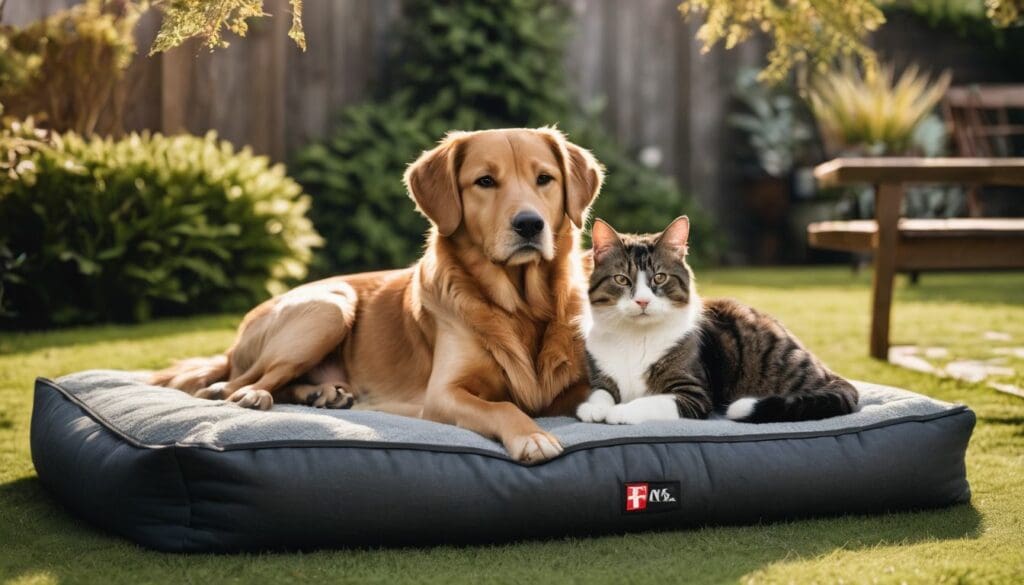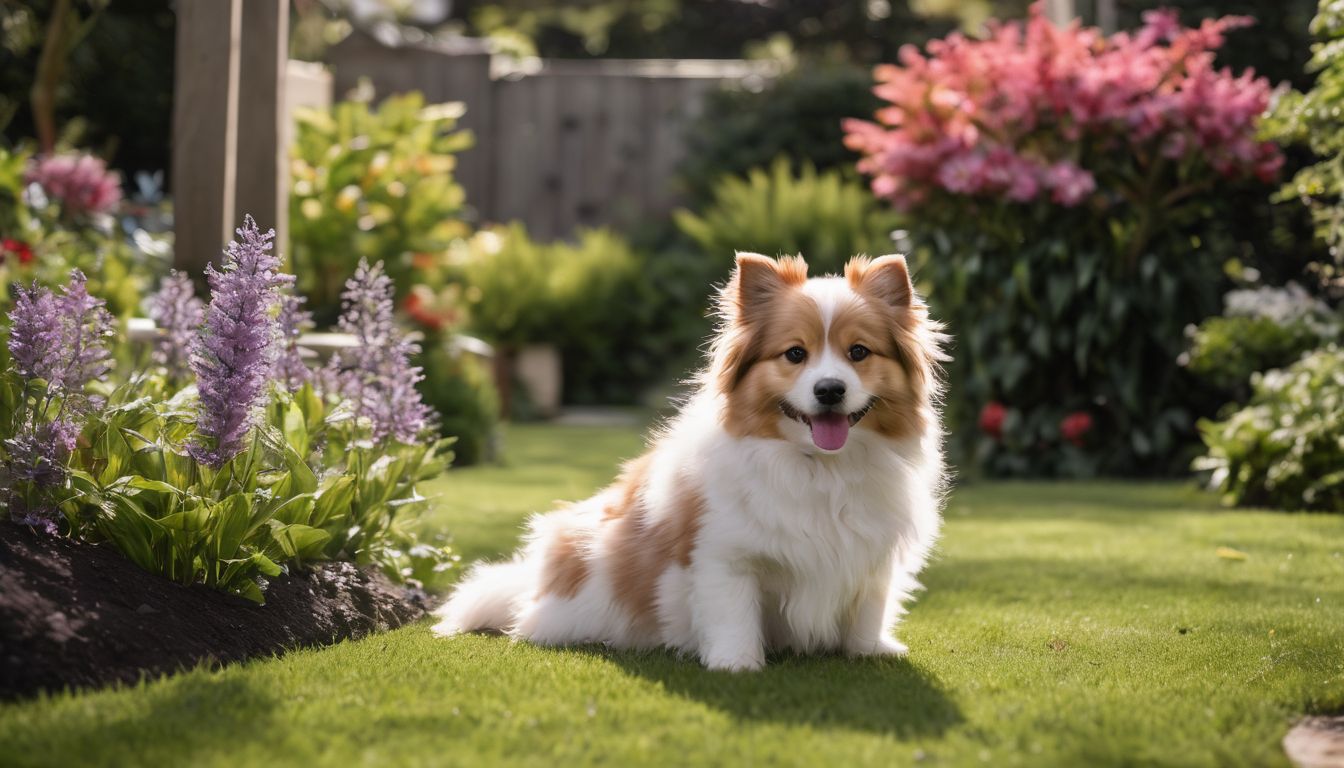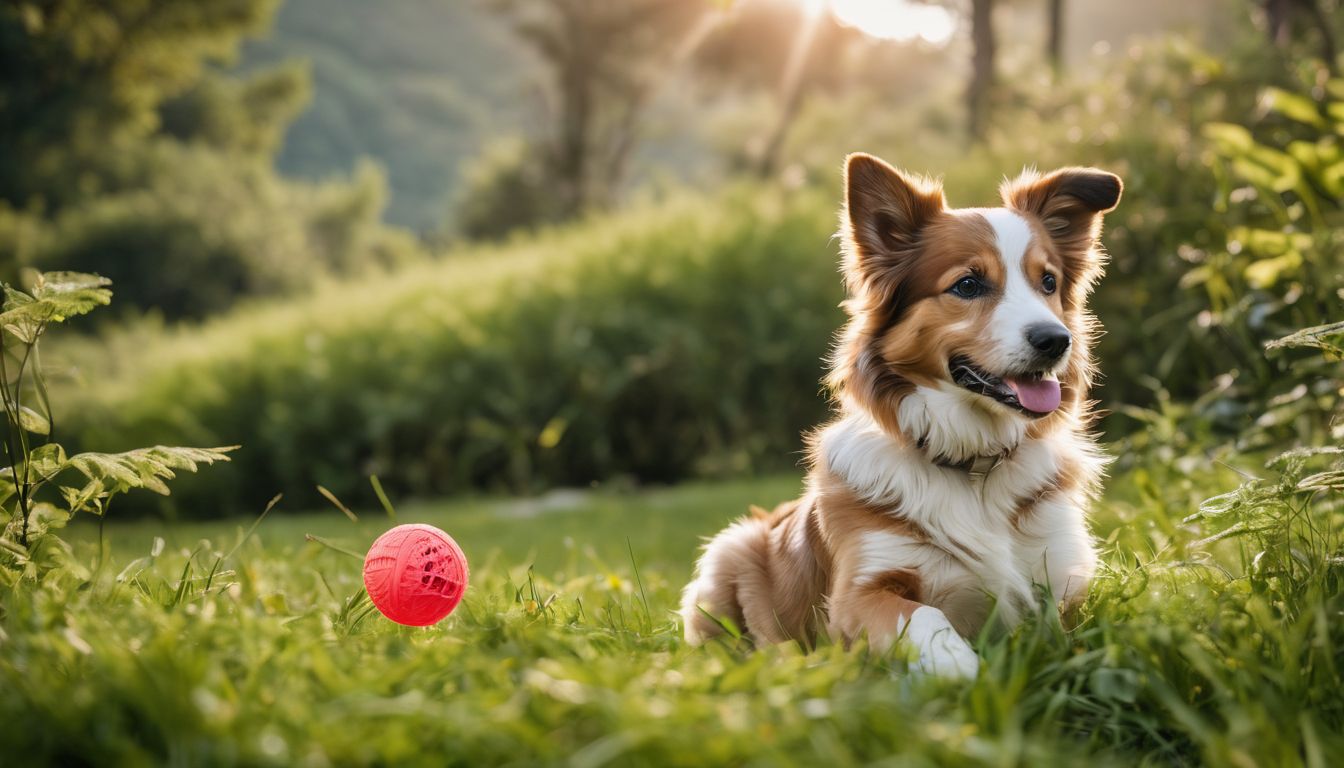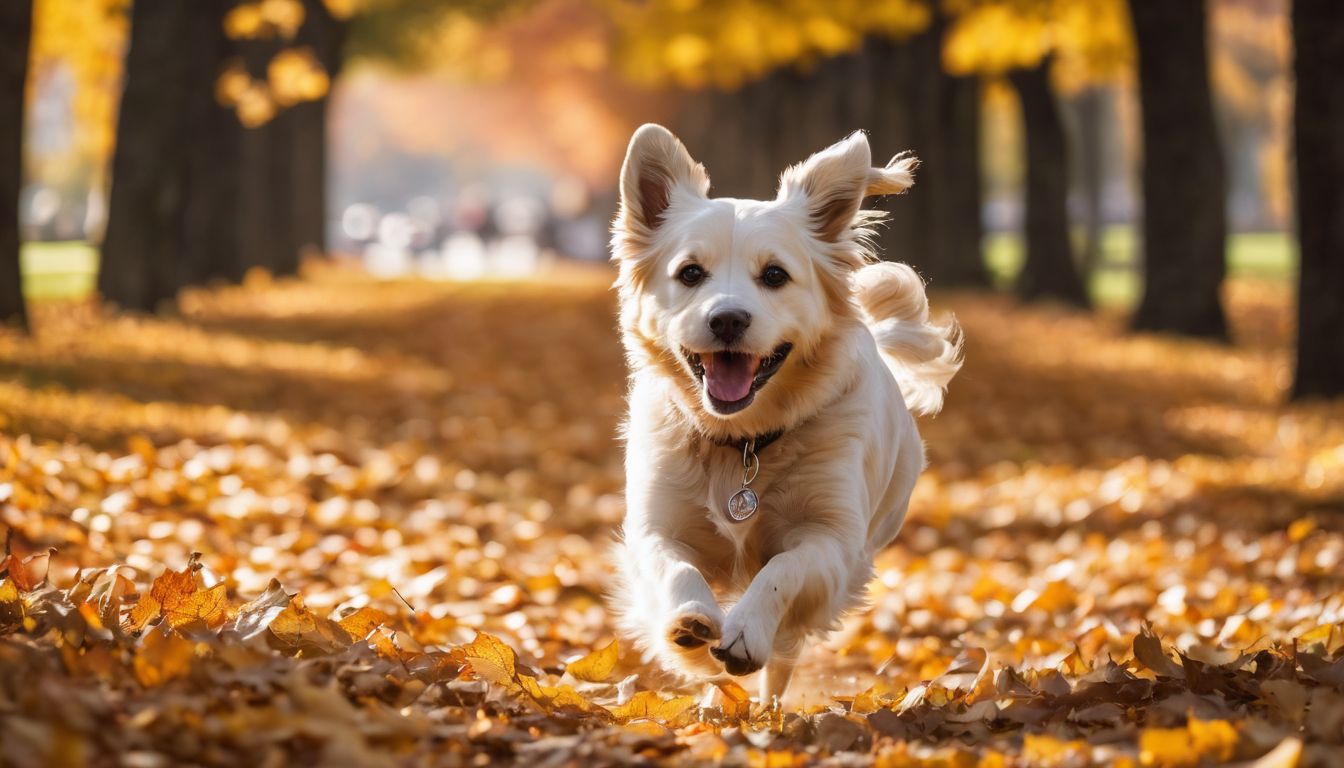Many pet owners worry about their furry friends’ impact on the planet. Surprisingly, pets can generate a significant carbon footprint with their food, toys, and waste. Our guide offers practical tips for reducing this paw print and embracing eco-friendly habits together with your beloved companion.
Discover how to be kind to Earth while caring for your pet!
Key Takeaways
- Use biodegradable bags for pet waste disposal to cut down on plastic pollution and promote sustainability. Composting systems can turn pet waste into compost for non-edible plants.
- Opt for sustainable pet care products, such as eco-friendly toys made from natural materials, grooming products without harsh chemicals, and pet food with organic ingredients to reduce your carbon footprint.
- Support local businesses that provide eco – conscious pet supplies to minimise transportation emissions and bolster community economies. Host toy exchange parties or craft with upcycled materials to further decrease environmental impact.
- Keep pets indoors when possible to protect wildlife, prevent disease spread among animals, and avoid outdoor pollutants that can harm both pets and the ecosystem.
- Encourage responsible pet ownership by educating others on the importance of using sustainably-sourced products and advocating for minimal use of plastics in all aspects of pet care.
How to Be an Eco-Friendly Pet Parent
When it comes to being an eco-friendly pet parent, there are several ways you can make a positive impact. From choosing biodegradable poo disposal options to mindful lawn care and sustainable cleaning products, every small change adds up to a greener lifestyle for you and your furry friend.
Biodegradable poo disposal options
Disposing of your pet’s waste in an eco-friendly manner is easier than you might think. Biodegradable poo disposal options offer a sustainable way to take care of pet messes without harming the planet.
- Opt for biodegradable bags over plastic ones. These are made from materials like corn-starch and break down much faster than traditional plastic.
- Consider a pet waste composting system. These systems are designed specifically for pet waste and turn it into usable compost for non-edible plants.
- Use paper or plant – based bag alternatives. Newspaper or bags made from plant fibres can wrap the waste and decompose naturally.
- Flush the poo where possible. If your plumbing allows, disposing of pet waste in the toilet gets treated along with household sewage.
- Support companies that produce earthfriendly pet supplies, including those making biodegradable disposal products.
- Investigate local disposal services that cater to ecoconscious pet care by safely composting your pet’s waste for you.
- Sprinkle sawdust or cat litter made from recycled paper on top of the mess to ease decomposition if you must dispose of it in regular trash.
Responsible waste management
When it comes to environmentally friendly pet ownership, responsible waste management is crucial. Proper disposal of pet waste and the use of biodegradable bags are essential steps towards sustainable pet care.
Minimising plastic use in pet waste products further supports ecoconscious pet parenting. Encouraging responsible pet ownership by disposing of waste appropriately is an influential aspect of green living with pets.
Sustainable grooming products for pets also contribute to responsible waste management. Choosing environmentally friendly options helps reduce the environmental impact of pet care.
Mindful lawn care
Maintaining an environmentally friendly lawn involves using organic fertilisers and natural pest control methods. Avoid chemical-based products to protect both your pets and the environment.
Opt for eco-friendly alternatives, such as compost or mulch to enrich soil and minimise water usage. Regularly aerate the soil to improve drainage and promote healthy root systems in your garden.
Sustainable yard care embraces preserving wildlife by planting native species of plants, which benefit local ecosystems and reduce reliance on synthetic pesticides. Consider creating designated play areas for pets to help limit damage to plantings, contributing towards sustainable pet ownership practices.
Recycled/Reduced packaging
Selecting pet products with recycled or reduced packaging is crucial for reducing environmental impact. Opt for eco-friendly materials such as biodegradable bags, cardboard, or paper whenever possible.
Supporting brands that prioritise sustainable packaging helps to minimise waste and conserve natural resources. When choosing pet supplies, look for options with minimal packaging or packaging made from recycled materials to support a greener lifestyle.
Sustainable cleaning
Opt for eco-friendly cleaning products to maintain a healthy home environment for your pets. Use natural, non-toxic cleaners made with sustainable ingredients that won’t harm the environment.
Look for biodegradable and phosphate-free options to minimise ecological impact.
Choose reusable and recyclable cleaning tools such as microfibre cloths, sponges made from recycled materials, and bamboo scrub brushes. These items reduce waste while providing effective and safe cleaning solutions for your pet-inclusive household.
Natural bug repellent
Choose natural bug repellents to keep your pets and the environment safe. Look for products containing essential oils like citronella, peppermint, or cedarwood. Also, consider using non-toxic sprays or collars with plant-based ingredients such as lemongrass and rosemary.
These alternatives effectively deter pests without harming wildlife or polluting the surroundings. Make sure to check for eco-friendly labels on bug repellent products to ensure they align with your green pet parenting values.
When choosing natural bug repellents for your pets, prioritise sustainable and low-impact options. Consider products made from recycled or biodegradable materials that reduce waste and support environmentally conscious pet care practices.
Eco-Friendly Products and Practices for You and Your Pets
Choose sustainable pet food and make homemade treats to reduce packaging waste. Support local businesses, host a toy exchange party, or craft with upcycled materials for eco-friendly pet toys.
Choosing planet-friendly pet food
Opt for eco-friendly pet food to reduce your furry friend’s carbon pawprint. Look for sustainably sourced and organic ingredients in their meals, such as plant-based proteins like lentils or peas.
Choose products with minimal packaging, reducing waste and promoting a greener lifestyle.
When shopping for planet-friendly pet food, consider brands that use recyclable or biodegradable materials. Opt for options free of artificial additives and fillers, supporting healthier pets and a cleaner planet.
Making homemade treats
After choosing planet-friendly pet food, another way to be environmentally conscious is by making homemade treats for your pets. This not only allows you to control the ingredients but also reduces packaging and waste associated with shop-bought treats. Here are some benefits of making homemade treats and ideas to get you started:
- Personalised Ingredients: Control what goes into your pet’s treats by using organic, locally sourced, and sustainably produced ingredients, ensuring they are both healthy and eco-friendly.
- Reduced Packaging Waste: By making treats at home, you reduce the amount of single-use plastic or non-recyclable packaging that comes with shop-bought options.
- Minimised Environmental Impact: Engage in low-impact pet ownership by reducing the carbon footprint associated with commercial treat production and transportation.
- Empowerment Through Creativity: Experiment with different recipes and involve leftover ingredients from your own meals or baking to create unique and eco-friendly treats for your beloved pets.
- Bonding Activity: Making homemade treats can be a fun family activity that brings everyone together while promoting sustainability in pet care.
- Upcycled Treat Containers: Repurpose glass jars or reusable containers to store your homemade pet treats instead of relying on disposable packaging.
- Supporting Local Economy: Purchase ingredients from local farmers’ markets or independent shops to reduce transport emissions associated with large-scale distribution networks.
- Resourcefulness in Baking: Use upcycled or biodegradable baking supplies such as silicone mats instead of disposable parchment paper for a more sustainable baking process.
Selecting eco-friendly toys
When selecting eco-friendly toys for your pets, consider the following options to reduce your environmental impact and provide safe and enjoyable playthings for your furry friends:
- Look for toys made from natural, sustainable materials such as organic cotton, hemp, or bamboo. These materials are biodegradable and minimise the use of synthetic resources.
- Opt for toys free from harmful chemicals and dyes to ensure the safety of your pets and reduce chemical exposure in the environment.
- Choose durable toys that can withstand frequent use, reducing the need for frequent replacement and minimising waste.
- Seek out toys that promote interactive play between you and your pet, encouraging physical activity and mental stimulation without relying on batteries or electricity.
- Consider multi – functional toys that serve dual purposes, such as a toy that also functions as a food puzzle or provides dental benefits for your pet.
- Support local artisans or small businesses that handcraft eco – friendly pet toys using upcycled or repurposed materials, helping to reduce carbon footprint and support local economies.
Supporting local and regional businesses
When purchasing pet supplies, consider supporting local and regional businesses that offer eco-friendly and sustainable options. Look for products made from upcycled or recycled materials, such as toys crafted with reclaimed fabrics or grooming accessories fashioned from repurposed materials.
By choosing to support local businesses, you can reduce the carbon footprint associated with transportation and contribute to the growth of your community’s economy.
Embracing environmentally conscious practices is not just about what we buy but also where we choose to make our purchases. Local and regional businesses often prioritise sustainability in their operations, offering products that align with eco-friendly values.
Hosting a toy exchange party
Looking to reduce the environmental impact of your pet’s toys while still keeping them entertained? Consider hosting a toy exchange party with other environmentally conscious pet owners. Here’s a step-by-step guide on how to organise a successful eco-friendly pet toy exchange:
- Invite like – minded friends and their pets to the exchange party, emphasising the importance of reusing and recycling pet toys.
- Set guidelines for the toy exchange, such as bringing gently used or unused toys that are clean and in good condition.
- Create a fun atmosphere with refreshments and activities for both pets and owners, making it an enjoyable social event.
- Arrange a swap area where attendees can display their pet toys for others to browse and select from.
- Encourage participants to share any additional ideas or tips for reducing waste related to pet toys and care.
- Discuss plans for future exchanges or other eco – friendly initiatives within the group to keep the momentum going.
Crafting with upcycled materials
- Repurpose old t – shirts or towels by plaiting them into durable chew toys.
- Create catnip – filled toys using leftover fabric scraps and cushion filling.
- Transform empty cardboard boxes into hideaways or climbing structures for cats.
- Make a cosy pet bed using an old sweater or blanket.
- Fashion a stylish collar or leash from repurposed belts or fabric scraps.
- Construct a DIY scratching post by wrapping old carpet remnants around a sturdy base.
- Design playful feather wands using discarded feathers and wooden sticks.
Considerations for Pet Waste
Proper disposal of pet waste is crucial for maintaining a clean and eco-friendly environment, so make sure to use biodegradable bags and minimise plastic usage when cleaning up after your pets.
To learn more about sustainable pet ownership, continue reading.
Proper disposal of pet waste
When disposing of pet waste, use biodegradable bags to reduce plastic pollution. Always pick up after your pets and throw the waste in designated bins. Opt for eco-friendly pet waste disposal solutions to minimise environmental impact.
Consider composting pet waste if local regulations permit it, utilising it as a natural fertiliser for non-edible plants.
Encouraging responsible pet ownership can make a significant difference in reducing the environmental footprint of pet waste. It is essential to educate others about minimising plastic use when cleaning up after their pets and promoting the use of biodegradable materials.
Using biodegradable bags
When disposing of pet waste, consider using biodegradable bags to minimise environmental impact. These bags are made from natural materials that break down over time, reducing the amount of plastic in landfills and oceans.
By choosing biodegradable bags, you can effectively manage your pet’s waste while contributing to a more sustainable ecosystem.
Minimizing plastic use
Minimise plastic use by opting for biodegradable poo bags made from sustainable materials, reducing environmental impact. Choose pet toys and accessories crafted from upcycled or recycled materials to decrease plastic consumption.
Select eco-friendly pet grooming products packaged in recyclable containers to support low-impact pet ownership. Encourage the use of non-plastic alternatives for food and water bowls, such as stainless steel or bamboo options, promoting an environmentally conscious lifestyle.
Encouraging responsible pet ownership
Responsible pet ownership involves providing adequate care for your pet and being mindful of its impact on the environment. Use biodegradable bags to pick up after your pet and minimise plastic waste.
Purchase sustainable pet products and eco-friendly supplies to reduce your carbon footprint while meeting your pet’s needs.
Choose planet-friendly pet food options such as ecoconscious brands that prioritise environmentally responsible ingredients. Maintain regular vet check-ups, ensure vaccinations are up-to-date, and spay or neuter pets to assist in controlling the population of stray animals.
Benefits of Keeping Pets Indoors
Keeping pets indoors helps to protect wildlife, reduce pollution, and keep pets safe from potential dangers. It also prevents the spread of diseases among animals in the community.
Protecting wildlife
Keeping pets indoors is an effective way to protect wildlife. Cats, in particular, are skilled hunters and can pose a significant threat to local bird and small mammal populations.
By keeping them inside, you reduce the risk of your pets hunting and harming wildlife.
Selecting eco-friendly pet food helps support wildlife preservation by reducing the demand for mass-produced meat that contributes to deforestation and habitat loss. Opting for sustainable options ensures that the delicate balance of our ecosystems remains undisturbed, benefiting both domestic animals and their wild counterparts.
Reducing pollution
Keeping pets indoors helps reduce pollution by minimising the spread of pet waste, which can contaminate water sources and contribute to environmental degradation. Also, it prevents pets from chasing wildlife, reducing the disturbance to natural habitats and ecosystems.
By being mindful of how we manage our pets’ waste and their interactions with the environment, we can actively contribute to a cleaner and healthier planet for all living creatures.
Keeping pets safe
Reducing pollution is essential for the well-being of both our pets and the environment. Ensuring that your pets are safe involves providing a secure home environment, using non-toxic cleaning products, and selecting pet-friendly plants.
Implementing pest control measures without harmful chemicals safeguards your pets from accidental poisonings. Regularly checking for hazards like loose cords or small items helps prevent potential accidents.
Minimising contact with toxins outside is crucial as well. Keeping all potentially toxic substances out of reach and engaging in regular veterinary check-ups help maintain your pet’s health.
Preventing spread of diseases
Prevent the spread of diseases by keeping your pets indoors. Limiting outdoor exposure reduces the risk of contracting and transmitting illnesses to other animals or wildlife. This proactive approach also minimises environmental contamination from pet waste, contributing to a healthier, greener ecosystem for all creatures.
Encouraging responsible pet ownership leads to a cleaner environment and safer communities. Providing a safe, indoor environment for your pets safeguards them against potential dangers outside while promoting eco-friendly practices that benefit both animals and nature.
Conclusion
In closing, integrating pets into an eco-friendly lifestyle involves making mindful choices. Choosing biodegradable poo disposal options and sustainable pet supplies is a great start.
Supporting local businesses and emphasising responsible ownership are key to minimising environmental impact. By adopting these practices, pet owners can play their part in preserving the planet for future generations.
FAQs
1. What does it mean to integrate pets into an eco-friendly lifestyle?
Integrating pets into an eco-friendly lifestyle means choosing sustainable pet grooming products, ecoconscious pet food, and green pet accessories that reduce environmental impact.
2. Can I find eco-friendly supplies for my pet?
Yes, there are many stores offering ecominded pet products and earthfriendly pet ownership supplies that help you care for your pet in a more environmentally responsible way.
3. How can I dispose of my pet’s waste in an eco-conscious manner?
You can use biodegradable bags or a dedicated composting system designed as part of an ecofriendly pet waste disposal approach to lower your carbon pawprint.
4. Are there specific green grooming options for pets?
Certainly! There is a range of green pet grooming choices including shampoos and brushes made from sustainable materials that contribute to environmentally friendly pet care.
5. Is it possible to feed my pets with environment-friendly food?
Absolutely, manufacturers now offer lowimpact and ecoconscious dog foods which focus on reducing the ecological footprint while maintaining nutritional value.





